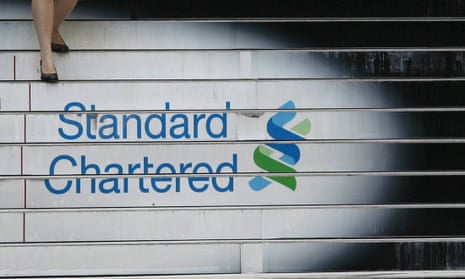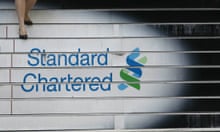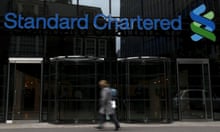Standard Chartered has plunged to its first full-year loss since 1989, sparking another turbulent day for its shares on the stock market and the revelation that it is considering clawing back bonuses from 150 senior staff.
The emerging markets focused bank revealed it is still being investigated for potential failings in its defences against financial crime as it reported a $1.5bn (£1bn) loss for 2015.
A review has been set up into whether bonuses can can be reclaimed after what Bill Winters, the new chief executive, described as a tumultuous year.
Major restructuring costs of $1.8bn (£1.28bn) and a $863m repricing of complex financial instruments drove the bank to the loss which alongside a 87% rise in bad debts signalled a dramatic reversal in its fortunes. A year ago it had reported a $4.2bn profit but since then Winters has been parachuted in to replace Peter Sands as chief executive.
Until three years ago, the bank had enjoyed 10 consecutive years of rising profits, even through the damaging 2008 financial crisis, but its focus on increasing revenues had led to a rise in problem loans. It specialises in emerging markets such as China, Indonesia and Korea.
“It rips at our souls every single time we look the results,” said Winters, who was paid $12.8m, including a $10m buy-out award. Sands was handed $4.6m after leaving in June and two other directors who have also left received more than $4m between them. Sands, who ran the bank during the 2008 crisis, is entitled to a $722,131 a year pension and during the year bonuses from previous years cashed in.
The market reacted sharply to the results with the shares diving 11% at one stage. The loss was later reduced to 5%, and the bank remained one of the biggest fallers in the FTSE 100.
As Winters announced that annual bonuses had been scraped for 2015, he said a new bonus scheme would be put to a shareholder vote at the annual general meeting in May. It will pay out nearly $9m to Winters if he achieves all the targets he set out in a three-year strategic review in November. Another 100 or so senior staff are also part of the new scheme.
A handful of managers are being handed pay rises after the bank ditched the allowances that had been awarded alongside salaries to side step the EU cap which limits bonuses to twice times salary. The bank paid out $28m in such allowances last year and only Winters and the finance director Andy Halford will continue to receive them.
Mike Rees, a long-standing colleague who is leaving in April after being paid around £50m since the 2008 crisis, was entitled to start receiving his pension 0f $833,935 a year earlier this month when he turned 60, the annual report showed.
Winters said: “Our performance was poor and, in many ways, unacceptable. Given current market conditions and the early stage of implementation of our strategy, we expect the financial performance of the group to remain subdued during 2016.”
At the half-year stage Winters halved the dividend and the final dividend has now been axed after a £3.3bn cash call and a restructuring involving 15,000 job cuts was announced in November. Axing senior managers cost $45m.
In November, the bank revealed it faced investigations by regulators in the US and UK. Winters said the bank was continuing to cooperate with the relevant authorities but “we remain unable to determine when these investigations will conclude or the size of any potential fines that might result. We will provide further updates in due course.”
The Financial Conduct Authority is investigating Standard Chartered’s financial crime controls, looking at their effectiveness and governance within the correspondent banking business carried out by its London branch.
Winters’ appointment signalled a major clearout of the former management of the bank, including the chairman, Sir John Peace, who said the search for his replacement was still going on.
Its shares have been languishing at 25-year lows, and other bank shares have been under pressure amid fears of a re-run of the 2008 crisis. But Winters said “this is not a banking crisis”, pointing to strong capital ratios and liquidity.
Sandy Chen, an analyst at Cenkos, said “despite the blood and gore” Standard Chartered had capital ratios well above the regulatory minimum.






Comments (…)
Sign in or create your Guardian account to join the discussion